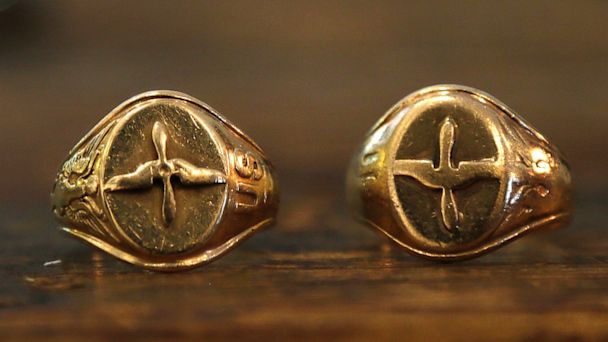American POW's Ring Makes It Home After Desperate World War II Trade
When his plane was shot down in 1943, U.S. Army co-pilot David Cox Sr. spent 18 months in a German prisoner of war camp during World War II. He and his fellow POWs lacked medical care, and they were cold and starved.
During that time, Cox made a desperate choice. He bartered a gold aviator ring that his parents had given to him when he earned his commission as a second lieutenant in the Army Air Corps. In exchange for the cherished ring, an Italian POW gave Cox two chocolate bars.
When his camp was liberated and he came home in August 1945, Cox's parents gave him a replica ring, which, just like the first, had his name and date of birth inscribed, but he never forgot the original, his son, David Cox Jr. said.
Soldier's WW II Letters to Wife Find Son 69 Years Later
"He told me a couple of times that he had made the trade and he was so hungry that he just, you know, felt like he needed to do it and at the time it probably seemed like a very rational decision, and - but when he gets home and he's got a belly full and he's content, then he wishes he had that ring back," Cox, 67, of Raleigh, N.C., told ABC News in a Tuesday interview.

Gerry Broome/AP Photo
Cox Sr. died in 1994, but his ring - the original - has found its way back to his family.
As his son tells the story, because Europe was in such financial turmoil after the war, precious metals were a precious commodity. The ring was likely traded several times, until it ended up with a Russian soldier who in turn gave it to a woman in exchange for room and board.
That woman's grandson is Martin Kiss, a Hungarian living in Germany. Kiss' neighbors, Mark and Mindy Turner, are Americans. When Kiss invited his neighbors over for dinner one day, he showed them the ring and told them the story. Because he doesn't speak much English, he enlisted their help to find the ring's owner, Cox said.
250 WWII Letters Found in Hatbox Prompts Search
The Tuners agreed. In fact, that same night after dinner, Mark Turner did a Google search for the name inscribed in the ring coupled with the phrase "lost ring." Up popped a master's degree thesis that was written in part on the wartime diary Cox Sr. kept and on Cox's squadron's World War II activities.
The thesis was written by Norwood McDowell, who just happened to be Cox Jr.'s son-in-law. When McDowell told Cox that the ring may have been found, he couldn't believe it, but he did when he was emailed a photo of the ring.
"You could read the inscription as clear as day," he said. "I got cold chills. I absolutely got cold chills when I saw the picture."
The ring was sent from Germany. When Cox saw it for the first time, he was amazed at the difference between it and the replica ring that his father had passed down to him, and which he'd worn until the band was worn so thin that he kept it in a jewelry box.
"I was amazed at how much better condition the original ring was compared to the one that I'd been looking at all my life. That was my first reaction, was look at the condition of this ring. Then my second reaction was, I wish my dad was here. I wish he could see this."
Purple Heart Found at Goodwill Returned to WWII Vet's Family
Kiss's own grandfather spent several years in a Soviet camp during and after the war. In an interview with The Associated Press, which first reported this story, he said his only regret is that David Cox Sr. and his grandmother weren't alive to share the "happy ending."
Refusing to accept even reimbursement for the shipping, he told the AP, "You know the old saying: 'It's better to give than to receive.'"

Gerry Broome/AP Photo